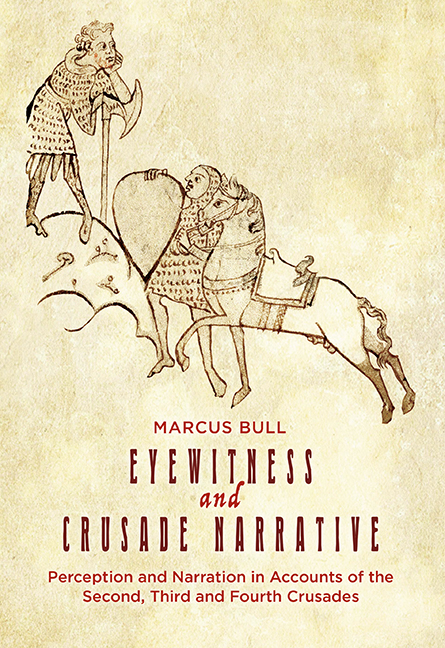 Eyewitness and Crusade Narrative
Eyewitness and Crusade Narrative Book contents
- Frontmatter
- Dedication
- Contents
- Acknowledgements
- Abbreviations
- Introduction: Medieval and Modern Approaches to Eyewitnessing and Narratology as an Analytical Tool
- 1 Memory and Psychological Research into Eyewitnessing
- 2 The Second Crusade: The De Expugnatione Lyxbonensi and Odo of Deuil's De Profectione Ludovici VII in Orientem
- 3 The Third Crusade: Ambroise's Estoire de la Guerre Sainte and Points of Comparison and Contrast
- 4 Geoffrey of Villehardouin's and Robert of Clari's Narratives of the Fourth Crusade
- Conclusion
- Bibliography
- Index
1 - Memory and Psychological Research into Eyewitnessing
Published online by Cambridge University Press: 12 February 2019
- Frontmatter
- Dedication
- Contents
- Acknowledgements
- Abbreviations
- Introduction: Medieval and Modern Approaches to Eyewitnessing and Narratology as an Analytical Tool
- 1 Memory and Psychological Research into Eyewitnessing
- 2 The Second Crusade: The De Expugnatione Lyxbonensi and Odo of Deuil's De Profectione Ludovici VII in Orientem
- 3 The Third Crusade: Ambroise's Estoire de la Guerre Sainte and Points of Comparison and Contrast
- 4 Geoffrey of Villehardouin's and Robert of Clari's Narratives of the Fourth Crusade
- Conclusion
- Bibliography
- Index
Summary
This chapter explores the possible lessons for the study of our target texts of research into the psychological dimensions of eyewitnessing. Researchers in cognitive psychology and related fields have done an enormous amount of work on the nature of eyewitness perception and recall, and for this reason alone it merits our close attention, as much in order to establish where this research is not consonant with historians’ methodologies and approaches as to find where there may be fruitful intersections. Before we examine some of the specifics of this research tradition, however, it is important to step back and consider the larger frames of reference within which psychological understandings of eyewitnessing operate. Because much of the research in this academic idiom is a subset of the large amount of work that scholars have done on memory, we need to establish what it is in various contexts that we understand by ‘memory’, an everyday but semantically slippery term. This will in turn allow us to align the thematic emphases of the present chapter in relation to those that follow it.
In vernacular usage we principally take memory to mean one of two things: it is our minds’ capacity to retain some parts our past experiences, or it is the product of our giving expression to these experiences. The process of expression may take place within the privacy of one's mind, but it is often outwardly articulated, typically but not necessarily in verbal modes. To be asked for one's memory for a particular experience is to be invited to retrieve that episode as preserved in some form in the mind, and then to give it communicative shape. (To this two-stage process, corresponding to the two main ways in which memory is popularly understood, we may perhaps add a third: an invitation to recall along such lines will also cue some awareness on the part of the person remembering with respect to the subjective quality of the act of recall. This feeling of correspondence between the memory and the experience-as-lived is often expressed in terms of ‘confidence’ or ‘accuracy’, and it accompanies the articulation of memories in the form of explicit indicators such as qualifications and metacommentary or implicitly in lexical choices, tone of voice, body language and facial expression, or other means.)
- Type
- Chapter
- Information
- Eyewitness and Crusade NarrativePerception and Narration in Accounts of the Second, Third and Fourth Crusades, pp. 72 - 125Publisher: Boydell & BrewerPrint publication year: 2018
